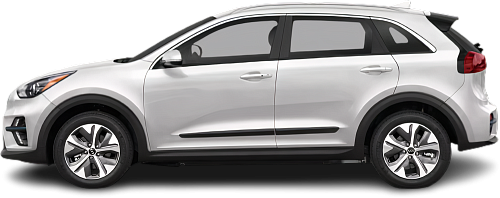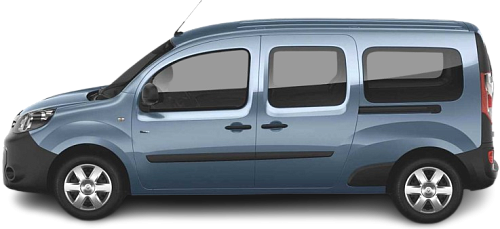Global EV Comparison: Kia Niro EV Standard Range vs Renault Kangoo Z.E. (E-Tech) 33 Maxi
Struggling to Decide? Let AI Help!
Your AI Summary Is Ready!
General Info
Since both vehicles have been discontinued, they are now only available on the used car market. You can get the Kia Niro EV Standard Range (2019-2022) for as low as €17885, while the Renault Kangoo Z.E. 33 Maxi (2017-2022) begins at €8890.
The Kia Niro EV Standard Range (2019-2022) is a SUV, whereas the Renault Kangoo Z.E. 33 Maxi (2017-2022) is a Minivan.
| Property | Kia Niro EV Standard Range | Renault Kangoo Z.E. (E-Tech) 33 Maxi |
|---|---|---|
| Years of Production | 2019-2022 | 2017-2022 |
| Current Status | Discontinued | Discontinued |
| Country of Manufacture | South Korea | France |
| Body Style | SUV | Minivan |
| Market Availability | EU | EU |
| Price Europe (Used) | €17885 | €8890 |
| GCC Score | 5.2 | 5.1 |
Range and Efficiency
While the Kia Niro EV Standard Range (2019-2022) offers a longer real-world range and a bigger battery, it is less energy-efficient than the Renault Kangoo Z.E. 33 Maxi (2017-2022).
| Property | Kia Niro EV Standard Range | Renault Kangoo Z.E. (E-Tech) 33 Maxi |
|---|---|---|
| Range (WLTP) | 289 km | 230 km |
| Range (GCC) | 246 km | 199 km |
| Battery Capacity (Nominal) | 42 kWh | 33 kWh |
| Battery Capacity (Usable) | 39.2 kWh | 31 kWh |
| Efficiency per 100 km | 15.9 kWh/100 km | 15.6 kWh/100 km |
| Efficiency per kWh | 6.28 km/kWh | 6.42 km/kWh |
| Range and Efficiency Score | 5.8 | 5.6 |
Charging
Both vehicles utilize a standard 400-volt architecture.
The Renault Kangoo Z.E. 33 Maxi (2017-2022) has no DC fast charging capability, whereas the Kia Niro EV Standard Range (2019-2022) can charge at up to 44 kW.
The Kia Niro EV Standard Range (2019-2022) features a more powerful on-board charger, supporting a maximum AC charging power of 7.2 kW, whereas the Renault Kangoo Z.E. 33 Maxi (2017-2022) is limited to 7 kW.
| Property | Kia Niro EV Standard Range | Renault Kangoo Z.E. (E-Tech) 33 Maxi |
|---|---|---|
| Max Charging Power (AC) | 7.2 kW | 7 kW |
| Max Charging Power (DC) | 44 kW | - Max Charging Power (DC) |
| Architecture | 400 V | 400 V |
| Charge Port | CCS Type 2 | Type 2 (Mennekes) |
| Charging Score | 4 | 3.1 |
Performance
Both vehicles are front-wheel drive.
The Kia Niro EV Standard Range (2019-2022) boasts greater motor power and accelerates faster from 0 to 100 km/h.
| Property | Kia Niro EV Standard Range | Renault Kangoo Z.E. (E-Tech) 33 Maxi |
|---|---|---|
| Drive Type | FWD | FWD |
| Motor Type | PMSM | PMSM |
| Motor Power (kW) | 100 kW | 44 kW |
| Motor Power (hp) | 134 hp | 59 hp |
| Motor Torque | 395 Nm | 225 Nm |
| 0-100 km/h | 9.8 s | 22.4 s |
| Top Speed | 155 km/h | 130 km/h |
| Performance Score | 3.1 | 1.4 |
Dimensions
The Renault Kangoo Z.E. 33 Maxi (2017-2022) is longer and taller, but about the same width as the Kia Niro EV Standard Range (2019-2022).
The Renault Kangoo Z.E. 33 Maxi (2017-2022) boasts a more extended wheelbase.
| Property | Kia Niro EV Standard Range | Renault Kangoo Z.E. (E-Tech) 33 Maxi |
|---|---|---|
| Length | 4375 mm | 4666 mm |
| Width (with Mirrors) | - Width (with Mirrors) | 2138 mm |
| Width (w/o Mirrors) | 1805 mm | 1829 mm |
| Height | 1560 mm | 1802 mm |
| Wheelbase | 2700 mm | 3081 mm |
Cargo and Towing
The Renault Kangoo Z.E. 33 Maxi (2017-2022) provides more cargo capacity, featuring both a larger trunk and more space with the rear seats folded.
Neither car is equipped with a frunk (front trunk).
The Renault Kangoo Z.E. 33 Maxi (2017-2022) has a towing capacity of up to 322 kg, whereas the Kia Niro EV Standard Range (2019-2022) is not officially rated for towing in the EU.
| Property | Kia Niro EV Standard Range | Renault Kangoo Z.E. (E-Tech) 33 Maxi |
|---|---|---|
| Number of Seats | 5 | 5 |
| Curb Weight | 1646 kg | 1585 kg |
| Cargo Volume (Trunk) | 451 l | 1300 l |
| Cargo Volume (Max) | 1405 l | 3400 l |
| Cargo Volume (Frunk) | - Cargo Volume (Frunk) | - Cargo Volume (Frunk) |
| Towing Capacity | - Towing Capacity | 322 kg |
| Cargo and Towing Score | 5.5 | 8 |




